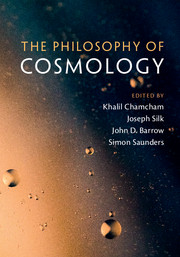Book contents
- Frontmatter
- Contents
- List of Contributors
- Preface
- Acknowledgments
- Part I Issues in the Philosophy of Cosmology
- 1 The Domain of Cosmology and the Testing of Cosmological Theories
- 2 Black Holes, Cosmology and the Passage of Time: Three Problems at the Limits of Science
- 3 Moving Boundaries? – Comments on the Relationship Between Philosophy and Cosmology
- 4 On the Question Why There Exists Something Rather Than Nothing
- Part II Structures in the Universe and the Structure of Modern Cosmology
- Part III Foundations of Cosmology: Gravity and the Quantum
- Part IV Quantum Foundations and Quantum Gravity
- Part V Methodological and Philosophical Issues
- Index
- References
4 - On the Question Why There Exists Something Rather Than Nothing
from Part I - Issues in the Philosophy of Cosmology
Published online by Cambridge University Press: 18 April 2017
- Frontmatter
- Contents
- List of Contributors
- Preface
- Acknowledgments
- Part I Issues in the Philosophy of Cosmology
- 1 The Domain of Cosmology and the Testing of Cosmological Theories
- 2 Black Holes, Cosmology and the Passage of Time: Three Problems at the Limits of Science
- 3 Moving Boundaries? – Comments on the Relationship Between Philosophy and Cosmology
- 4 On the Question Why There Exists Something Rather Than Nothing
- Part II Structures in the Universe and the Structure of Modern Cosmology
- Part III Foundations of Cosmology: Gravity and the Quantum
- Part IV Quantum Foundations and Quantum Gravity
- Part V Methodological and Philosophical Issues
- Index
- References
Summary
Introduction
In my opinion, nothing useful has ever been written on the question in the title, and small is the contribution that I have to offer. I outline an explanation for why there is something rather than nothing, an explanation which, however, I believe is incorrect because it makes a certain empirical prediction (absence of qualia) that is incorrect. Nevertheless, it may be interesting to discuss this reasoning. It allows, in principle though not in practice, to derive the laws of nature and all physical facts about the universe. Then I elucidate which objections to this explanation are, in my opinion, valid and which are not.
Explanation in physics usually works this way: observable phenomena get explained by physical theories. A physical theory is the hypothesis that the physical world consists of certain kinds of physical objects governed by certain laws. From this hypothesis we derive, or we make it plausible that it can be derived, that the phenomenon in question (typically) occurs; then we say that the theory explains the phenomenon. The physical theory does not explain why these kinds of physical objects exist, why others do not, and why these laws hold; instead of explaining them, the theory merely posits them. At best, some theories are simpler and more elegant than others (e.g. Einstein's general relativity more than Newton's theory of gravity). But no physical theory comes close to explaining why these laws hold, or why there exist any physical objects at all. Thus, no physical theory contributes to the question in the title.
Specifically, some physical theories allow for the possibility of a vacuum state, i.e. that at a certain time there is no matter in space, and for the possibility of a transition from a vacuum state to a non-vacuum state, i.e. that at some other time there is some matter in space. While such a theory has some explanatory value, it does not touch upon the question in the title, as it does not explain the physical laws, nor why space-time exists,1 nor why certain kinds of matter (described by certain kinds of mathematical variables) exist and others do not. For related discussion, see Holt's overview [4] and Albert's critique [1] of Krauss's book [5].
- Type
- Chapter
- Information
- The Philosophy of Cosmology , pp. 76 - 82Publisher: Cambridge University PressPrint publication year: 2017
References
- 2
- Cited by



